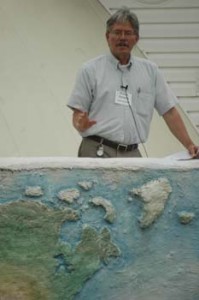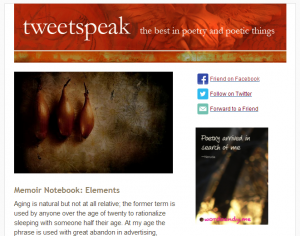In 2011 here at Tweetspeak Poetry, I reviewed Why the House is Made of Gingerbread: Poems by Ava Leavell Haymon, a retelling of the story of Hansel and Gretel in poetic form (with a few additional poems as well). We also featured one of her poems that year for National Poetry Month.
Her other collections of poetry include The Strict Economy of Fire (2004), Kitchen Heat (2006), and Eldest Daughter (August 2013). All, including the Gingerbread poems (2010), are published by LSU Press (proving, as I occasionally have to do, that my alma mater is about more than football). On Friday, I received an email from LSU announcing that Haymon had just been named Louisiana’s poet laureate.
Yes, I know what you’re thinking. “Louisiana has a poet laureate? Who knew?” Well, Louisiana does have a poet laureate, and for the next two years it’s Haymon. (She conveniently lives in Baton Rouge, the state capital.)
There haven’t always been poet laureates running around various states; in fact, the office of the U.S. Poet Laureate has been a fixture only since 1985. Perhaps we became concerned that what had been a major literary form for thousands of years was in something of a decline (even I can’t remember the days when newspapers published poems every day). Whatever the reason, we now have a new national poet laureate every two years (currently it’s Natasha Trethewey) and quite a few state poet laureates as well.
My idea of a poet laureate used to be someone who attends literary conferences and presidential or gubernatorial inaugurations to read a poem written for the occasion, holds sway at salons attended by other major literary figures, and occasionally gets an honorary degree from a university. (The wearing of a headpiece of laurel leaves likely went out with the Romans, however.)
Then I met Walter Bargen.
A few years back, a “festival of words and paper” was being held at a high school in one of our many, many St. Louis suburbs (95 distinct municipalities and counting). The event was actually held in the high school’s parking lot, a kind of literary tailgate party. There were exhibits, booths, book stalls, children’s activities, and a noticeable absence of a large crowd.
Walking through the rows of booths, I spotted one stall bravely manned by a man my age or slightly older, who was simultaneously looking hopeful and forlorn. No one else was around, though a few people would glance at his table of books before hurrying on.
The table featured books of poetry, all by the man in the booth. I looked at the author’s name, and then glanced up.
“You’re Walter Bargen, ” I said, “Missouri’s Poet Laureate. I’ve read two of your collections.”
The resulting smile told me I had just made his day. “Which ones? And did you like one better than the other?”
Trick question to see if I knew what I was talking about, right? I surprised him when I asked him about the poem about the fish.
For 30 minutes, we talked poetry, books, the fair, and what he actually did as a poet laureate.
I had a few misconceptions. More than a few, actually.
“I’m in the car a lot, ” he said. Missouri’s poet laureates have the option of traveling around the state or not. He chose to travel. He guessed he had driven more than 5, 000 miles in his first year as a poet laureate, all within the state’s borders.
He spoke and read poetry at high schools, middle schools, a few elementary schools, colleges, churches, even occasional political gatherings (I suppose when the governor needed to look literary). He attended poetry readings in pubs and restaurants, and lectured at poet and writer conferences. And Bargen had experienced a full range of reactions and responses, from bored and borderline unruly seventh-grade boys to rapt English teachers and enchanted would-be poets gulping down their beers.
He didn’t see the job of poet laureate as work, but he worked hard at it. Poetry was his passion and the focus of his life, and he was constantly crisscrossing the state of Missouri in the service of what he loved. Although he’s been out of the job for a few years, he still travels the state for poetry.
So, Ava Leavell Haymon, as you undertake the top poetry job in Louisiana (perhaps the only poetry job in Louisiana), your focus for the next two years will be what you make it. You’ll experience boredom and exhaustion, embarrassment and acclaim. Seventh-grade boys may throw paper airplanes as you read a poem. And you’ll read a lot of poetry, your own and others, and you will listen politely to a lot of bad poetry being read.
But somewhere in that audience of classroom, somewhere in that pub or hotel conference room, you will touch someone’s heart and inspire them to do what they never would have previously dreamed of.
And that will be to write a poem. A good poem.
Related:
Tweetspeak Poetry review of Walter Bargen’s Days Like This Are Necessary.
Photograph by Andy Devine. Sourced via Flickr. Post by Glynn Young, author of the novels Dancing Priest and the recently published A Light Shining.
___________________________
Subscribe to our free weekly newsletter.
We’ll make your Saturdays happy with a regular delivery of the best in poetry and poetic things.
Need a little convincing? Enjoy a free sample.
- Longfellow’s “Paul Revere’s Ride”: Creating a National Legend - April 17, 2025
- Poets and Poems: Katie Kalisz and “Flu Season” - April 15, 2025
- Poets and Poems: Michelle Ortega and “When You Ask Me, Why Paris?” - April 10, 2025



Gloria Klein says
WHERE ARE AMERICAN POETS BORN?
(Based on data from “The Best American Poetry 2012,edited by Mark Doty)
–Gloria Klein
Poetry in English could be in decline because the publishing deck is stacked against some poets, especially poets from the US heartland. Mark Doty makes my point. He has edited the 2012 anthology THE BEST AMERICAN POETRY OF 2012. He has selected 75 poets to represent “the best American poetry,” and written an introductory essay to the book.
In his essay Doty expropriates the Catholic tradition of the Venerable Bede and the poet Caedmon to ground what is for the most part, a secularist, Marxists poetry. Bede writes of Caedmon “…a certain brother particularly remarkable for the Grace of God, who was wont to make religious verses, so that whatever was interpreted to him out of scripture, he soon after put the same into poetical expressions of much sweetness and humility in English, which was his native language. By his verse the minds of many were often excited to despise the world, and to aspire to heaven.”
It is odd that Dotty would spend a large part of his introduction writing about Caedmon, when this first English poet represents two things contemporary poetry ignores: poems written in praise of God, and poems written by someone who has the gift of talent.
What secularist, Marxist publisher who controls most poetry today would publish a poem that praises the God of Abraham, Isaac and Jacob? What creative writing program or workshop leader would admit that to be a poet you need the gift of talent? To do so would put them out of the PO-biz.
If Doty had gone deeper into Christian theology and scripture, he might not have published in the 2012 anthology the poem by Stephanie Brown, ‘Notre Dame.’ Doty should know that the poem contains a fundamental error about the nature of angels.
Many believe that Christian revelation, scripture and theology tell us that angels are neither male nor female, but sexless spiritual beings. Beyond that, evey name of an angel we know of from scripture is a masculine name. This is not to say that Brown did not have a vision, but it is to say that if what she saw were angels, then they could not have been male and female.
Brown’s error detracts so much from her poem that the poem ought to have been rejected by an editor versed in the Christian tradition. In Doty’s case, if you have to drop one poem from the anthology to make room for a Chicago born poet, ‘Notre Dame’ would be the poems to omit.
Making room for a Chicago born poet beings us to the other reason American poetry is in decline–geography determines poetic destiny. Below is a list of where the poets selected for the 2012 anthology were born or raised. An asterisk is placed after East and West coast cities. Looking over the list, we see that Doty’s introduction and Brown’s poem are not the only oddities in this 2012 anthology.
Spokane, WA*
Manchester, CN*
Vallejo, CA*
Wilmington, DE*
Bangor, ME*
San Francisco, CA*
Oceanside, CA*
Bakersfield, CA*
Pasadena, CA*
Pasadena, CA*
Toronto, CA*
New Brunswick, NJ*
Charlotte, NC*
Wolfeboro, NH*
Fukuoka, JAPAN
Detroit, MI
Casa Grande, AZ
Columbia, ML
Forest Hills, NY*
Oak Park, IL
Homestead, PA*
Cape May Country, NJ*
San Francisco, CA*
Columbus, IN
Columbia, SC*
CANADA
Unknown
New York City, NY*
Cleveland, OH
Rochester, NY*
Kalamazoo, MI
Winchester, VI*
Newark, NJ
Jackson, MS
Brooklyn, NY*
Germantown, PA*
Cedar Rapids, ID
New York City, NY*
Bellingham, WA*
Lexington, MS
New York City, NY*
New York City, NY*
Minneapolis, MN
Los Angeles, CA*
Maple Heights, OH
Holyoke, MA*
New York City, NY*
Long Branch, NJ*
Stockton, CA*
Hartford, CT*
Seattle, WA
McKeesport, PA*
Wildwood, FL*
Unknown, CA*
Grand Rapids, MI
Brooklyn, NY*
St. Louis, MO
Okinawa, Japan
Niagara Fall, NY*
Falmouth, MS
Columbia City, IN
Sommerdale, Canada
Ann Arbor, MI
Brooklyn, NY*
Gulfport, MS
Pittsburgh, PA*
Vienna, Austria (lives in Waltham, MA)*
Albany, NY*
Columbia, PA*
Lincoln, NE
You say the poetic arts are tilted toward the two coasts. You say the poetic arts are tilted towards the decadent sentiments of the liberal East and West coasts, avoiding the fly-over country of the midwest. You say poetry is in decline because it no longer comes from the heartland. Prove it.
Not one poet in the 2012 anthology Mark Dory edited was born in Chicago, even though Slam Poetry was invented in Chicago and the city is home to Poetry Magazine! Even our reputed President claims Chicago as his home town.
When we say born in Chicago, we mean born in the city, not near Chicago, like Oak Park. Oak Park doesn’t count as a Chicago birthplace because as Hemingway said, Oak Park is a place of “broad lawns and narrow minds.” Once, the narrow, Oak Park minds tilted Right, now, they tilt Left. Same difference.
Here is more data that suggest active discrimination, not chance: Total poets in the anthology: 75, Percentage of poets from the East and West coast: 55%, Percentage of poets from just the East Coast alone: 40%.
Do the math. This is discrimination pure and simple in the poetic arts. Why?
Maybe because even in its Democrat-politics-worst, Chicago is vital. The poems in Doty’s anthology are just weary and come from word heavy heads. Life has gone out from those poems and that’s what the progressives who pull the strings on the poetry puppets want most of all–death singing the song of death.
When it comes to poetry anthologies in 2012, it’s the same old same old. This is evident when we look back to 1991. Gloria Klein reviewed the Best American Poetry anthology for 1991, edited by Mark Strand (Klein, Gloria. Performance Poetry and the Silence of the Page. Chicago: Alphabeta Press, 1991).
Klein writes in her review, “This book is incorrectly titled. It is not an anthology of the best American poetry of 1991. It should really be called New York Poetry, 1991. To say that the poetry in it is the best, is presumptuous. What this book really is, is a compilation of dead prose and friends publishing their friends. It hardly recognizes that there is an America west of the Hudson River, let alone that there are poets out there as well.”
“There are seventy-five poets represented in this book. Fifty-six percent of them are from the East Coast; a full twenty-five percent are from the New York City area. The poems published in the book were first published in thirty-three magazines; seventy percent of these magazines are either in New York City or other East Coast cities like Boston. Do we need this kind of provincialism in a book that claims to be the best poems published in 1991? One wonders if the editor actually leaves New York City or reads anything that is not published there.”
“In his poem, ‘The Seasons,’ included in this anthology, David Shapiro writes, ‘I saw the ruins of poetry.’ There is no more apt line to use in this review. Most of the poems in this anthology are really prose passages set up to look like poems. It is hard to care about them. Does the country need another John Ashbery poem anyway?”
Beyond that question there is another: Does the poetry world need any more to do with New York in its many forms? Consider Heather from New Hampshire’s poem published in The New Yorker and included in Doty’s anthology (Does the name, Heather Christle, seem a better metaphor than the ones in her poem?).
How does something like Christle’s BASIC get published? If it’s not an East coast birth; the “new” of New York matting with the “new” of New Hampshire, then what? Maybe a recent article in the Onion (June 4, 2013) by Joyce Carol Oates holds the secret to a writer’s success. It’s not where you are born but who you have sex with. Oates writes, “Success in writing takes serious commitment and a willingness to devote thousands of hours to the craft of having sex with key publishing professionals.”
So, if the explanation in Onion is dismissed, how do we account for the prejudice against poets born in Chicago? Most likely, this prejudice is not malicious, but like all prejudices, is simply unconscious. Because the prejudices of an editor are unconscious, the best way to understand these outcomes is to use a metaphor. Poetry in the United States is like baseball. The best poetry of 2012 is really an all-star game between the players from the East and West coast.
Yes, there are other teams, The Cougars from Iowa and the Mules from the Louisiana, but it’s the New Yorkers who keep hitting poetry home runs. Beyond the regional poetry teams, there are local poetry groups like little league teams. Some of these little league teams may send a player to the big leagues, while others just try to shake off the ghost of Elizabeth Barrett Browning.
And so the poetry game is played. Little magazines wave in the stacks of university libraries like pennants. Root, root, root for the home team! But like all metaphors, poetry as baseball eventually strikes out. The game of poetry is not a sport, after all. In fact, poetry in the United States today is simply the propaganda arm of the moribund liberal state.
There is no secret to playing the raifierd game of poetry. Just write propaganda in praise of multiculturalism, get interviewed by Bill Moyers, and move to Vermont. All thing may not hang from a drop of dew, but for Bush hatting poets in Florida, they may hang from a dangling chad.
Twenty-two years have passed since Gloria Klein wrote her review and twenty-two more years may pass after Mark Doty’s anthology. Things have not gotten better in the game of poetry for Chicago poets. Unless some new umpires emerge from the farm teams, they may never get better.
###
Maureen Doallas says
Thanks, Glynn. I wrote and advance-scheduled for the 29th a profile on Haymon as part of my PL series. I included a link to her poem on TweetSpeak and a good list of resources. I also have two other state-PL-related posts scheduled, one for before and one to follow the one on Haymon.
davis says
there’s a poem about a fish?